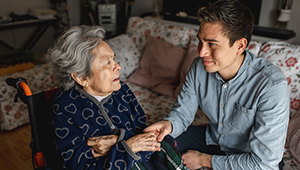Marlaine Figueroa Gray, PhD
Biography
Marlaine Figueroa Gray, PhD, is a medical anthropologist with a passion for eliciting illness narratives and health care experiences from patients, family members, and medical professionals. She has researched how the intersection of creative practices and medical care provide insight into understanding the logic of biomedical care, what counts as evidence that a creative activity "works," and how arts activities can serve as a model of how to provide better, more patient- and family-centered care. She is particularly interested in how we attend to patient suffering, and in what types of care are possible when no medical treatments are available.
Her previous work includes examining education policy in sub-Saharan Africa and developing curricula for health education, specifically HIV/AIDS education in Kenya and Mozambique.
Dr. Figueroa Gray has extensive experience designing qualitative studies and analyzing qualitative data. At Kaiser Permanente Washington Health Research Institute (KPWHRI), she uses this expertise to examine how patients, family members, and physicians make medical decisions when outcomes are uncertain and stakes are high, such as deciding whether or not to participate in an immunotherapy trial, or choosing which treatments to pursue as an adolescent or young adult with advanced cancer. She founded the KPWHRI Qualitative Research Interest Group, which supports outstanding qualitative research at the institute.
RESEARCH INTERESTS AND EXPERIENCE
-
Child & Adolescent Health
-
Social Determinants of Health
-
Complementary & Integrative Health
Implementation of alternative healing programs in U.S. hospitals; patient and provider experience of alternative healing programs
-
Medical Education
Use of the arts in medical education; history of medical education; medical school curriculum development -
Cancer Care and End of Life Care
Oncology support and care; end of life decision making
-
Integrative Medicine and Arts in Healing Programs
Participant experience; benefits; values and funding; legacy projects -
Patient-Centered Care
Shared decision making; care logics
-
Global Health
HIV/AIDS education; maternal and child health; sub-Saharan Africa
Recent publications
Hansell LD, Hsu CW, Mogk JM, Paz SR, Moore DD, Macias MM, Bhakta BB, Crawford CL, Ellis D, Lopez C, Jackson T, Graves R, Corralejo V, Gray MF, Young DR, Drewnowski A, Lewis KH, Murali SB, Coleman KJ Experiences and Perspectives of Racially Diverse Patients 5 Years Post-Bariatric Surgery: Qualitative Findings from the BELONG II Study 2025 Oct 16 doi: 10.1007/s40615-025-02635-y. Epub 2025-10-16. PubMed
Hoopes AJ, Metje A, Miller C, Tomlinson CM, Dao TD, Gray MF "Really hard to navigate": A qualitative study of motivators, barriers, and supports of adolescent-clinician communication on patient portals 2025 Oct;38(5):554-561. doi: 10.1016/j.jpag.2025.03.007. Epub 2025-04-04. PubMed
Abrahão R, Brunson A, Ruddy KJ, Li Q, Li J, Ryder MM, Chubak J, Nichols HB, Sauder CAM, Gray MF, Hahn EE, Wun T, Keegan THM Late endocrine diseases in survivors of adolescent and young adult cancer in California: a population-based study 2024 Apr;130(7):1166-1175. doi: 10.1038/s41416-024-02594-x. Epub 2024-02-08. PubMed
Tuzzio L, Gleason KS, Ralston JD, Drace M, Gray MF, Bedoy R, Ellis JL, Grant RW, Bayliss EA, Jauregui L, Bermet ZA Managing Multiple Chronic Conditions during COVID-19 Among Patients with Social Health Risks 2024 Mar;37(2):172-179. doi: 10.3122/jabfm.2023.230053R2. PubMed
Nichols HB, Wernli KJ, Chawla N, O'Meara ES, Gray MF, Green LE, Baggett CD, Casperson M, Chao C, Jones SMW, Kirchhoff AC, Kuo TM, Lee C, Malogolowkin M, Quesenberry CP, Ruddy KJ, Wun T, Zebrack B, Chubak J, Hahn EE, Keegan THM, Kushi LH Challenges and Opportunities of Epidemiological Studies to Reduce the Burden of Cancers in Young Adults 2023 Sep;10(3):115-124. doi: 10.1007/s40471-022-00286-9. Epub 2022-03-29. PubMed
Healthy findings blog

Reframing how we speak about dying
In a recently published blog based on her legacy research, Marlaine Figueroa Gray describes how to talk about death.
Research

Supporting young adults through cancer and beyond
A potential new care model for young cancer survivors centers patient needs, support networks.
Healthy findings blog

Creating meaning in health care
Research by Marlaine Figueroa Gray, PhD, includes exploring the intersection of medicine and creativity.



